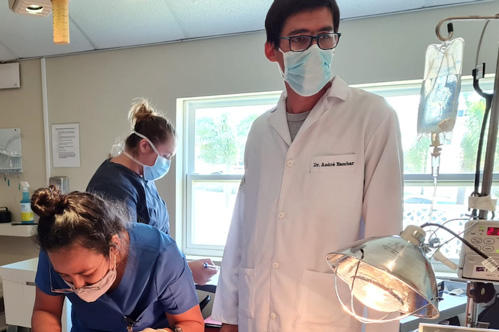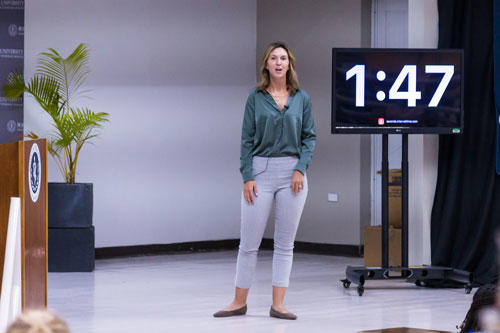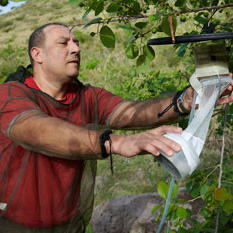One Health veterinary medicine recognizes that the health of people is intrinsically connected to the health of animals and the environment. It brings together researchers from diverse fields, including veterinarians, healthcare professionals, and agricultural and environmental scientists. They work alongside governments, non-governmental organizations (NGOs), communities, and the public to achieve the best health outcomes for all.
VETERINARY CONTRIBUTIONS USING ONE HEALTH
Veterinarians at Ross University School of Veterinary Medicine (Ross Vet) are helping to lead research using a One Health approach, and students have opportunities to get involved. While public health focuses on preventing diseases and promoting health of humans, One Health veterinary medicine broadens the public health approach by additionally encompassing veterinary medicine and the environment. One Health recognizes that the health of people is connected to the health of animals and the environment and aims to achieve optimal health outcomes for all.
“I am a poo person, a parasitologist, and I constantly go on about picking up dog feces, whether in a dog park, on a hike, or in a fenced in dog run or yard,” says Dr. Jennifer Ketzis, a professor of parasitology at Ross Vet. “A pet owner might not see the importance of picking up the feces if the dog is on a regular deworming program, which keeps infections to a low level and the dog healthy. However, looking at the feces from a One Health perspective and explaining it to the pet owner from that perspective, increases the relevance of picking up the feces. Those low infections in feces left on the ground could lead to a child being exposed to a zoonosis and to wildlife being exposed.”
One Health veterinary research examines a wide variety of relationships. Each year, Ross Vet dedicates a week to One Health, focused on a particular theme. Ross Vet Research Week is designed to elevate and amplify the diversity of research and scholarship across our key stakeholders including faculty, students, alumni, industry, government, and the wider community. The 2021 theme was called One Health: Food for Thought. It addressed the global challenge to feed, house, and provide a healthy life for the growing human population while preserving the planet’s environment and resources. Other One Health weeks have focused on such topics as the oceans and viruses.
ROLE OF A VETERINARIAN IN ONE HEALTH
Veterinarians play a crucial role in One Health, and in a variety of ways. The role of the veterinarian in One Health includes being clinical practitioners, epidemiologists, ecological experts, parasitologists, and more. Whether a clinical vet treats pets or large animals, they must always consider the animal in its ecological context. An animal’s relationships with other animals can spread disease, sometimes threatening the food supply or human health.
The role of the veterinarian in One Health has become more prominent with growing concerns over zoonotic diseases. Zoonotic disease refers to bacteria, viruses, or fungi that cross over from animals to human beings and cause disease. Disease can also pass from human beings to animals. For example, scientists believe the virus that causes COVID-19 originated in wild bats, but it has also spread from human beings to other animals.
But this concern extends beyond even a pandemic—veterinary research and other studies have shown that at least 75% of emerging and re-emerging diseases are zoonotic. A One Health approach focuses on ecosystems and the environment, showing how habitat destruction contributes to the emergence of zoonotic disease. For example, the zoonotic diseases AIDS, Ebola, and SARS are all thought to have crossed over to people because of human encroachment on wild areas and the bushmeat trade in particular. At Ross Vet, veterinary research into zoonotic disease is centered on the school’s One Health Center for Zoonoses and Tropical Veterinary Medicine.
ONE HEALTH AT ROSS VET
Ross Vet offers a Master’s Degree in One Health and a Graduate Certificate in One Health to train vets and other professionals in One Health veterinary medicine. The program is anchored by the One Health Research Center, whose veterinary discoveries help drive the field forward. But One Health informs all education at Ross Vet.
“[T]he relationship between human, animal, and environmental health is actually a foundational concept in many aspects of veterinary education and medicine. As such, it is incorporated in many of the required and elective classes and in club activities. In this respect, it no longer becomes a taught concept but a movement that drives underlying considerations,” Dr. Ketzis says.
If One Health veterinary medicine has piqued your interest, learn more about it and discover One Health and other career paths open to Doctors of Veterinary Medicine (DVMs). Check out the DVM program at Ross Vet, and when you’re ready for the challenge, gather your materials together and apply for admission. A career working with animals awaits, and you may help humans and the planet along the way.
Related Resources:






